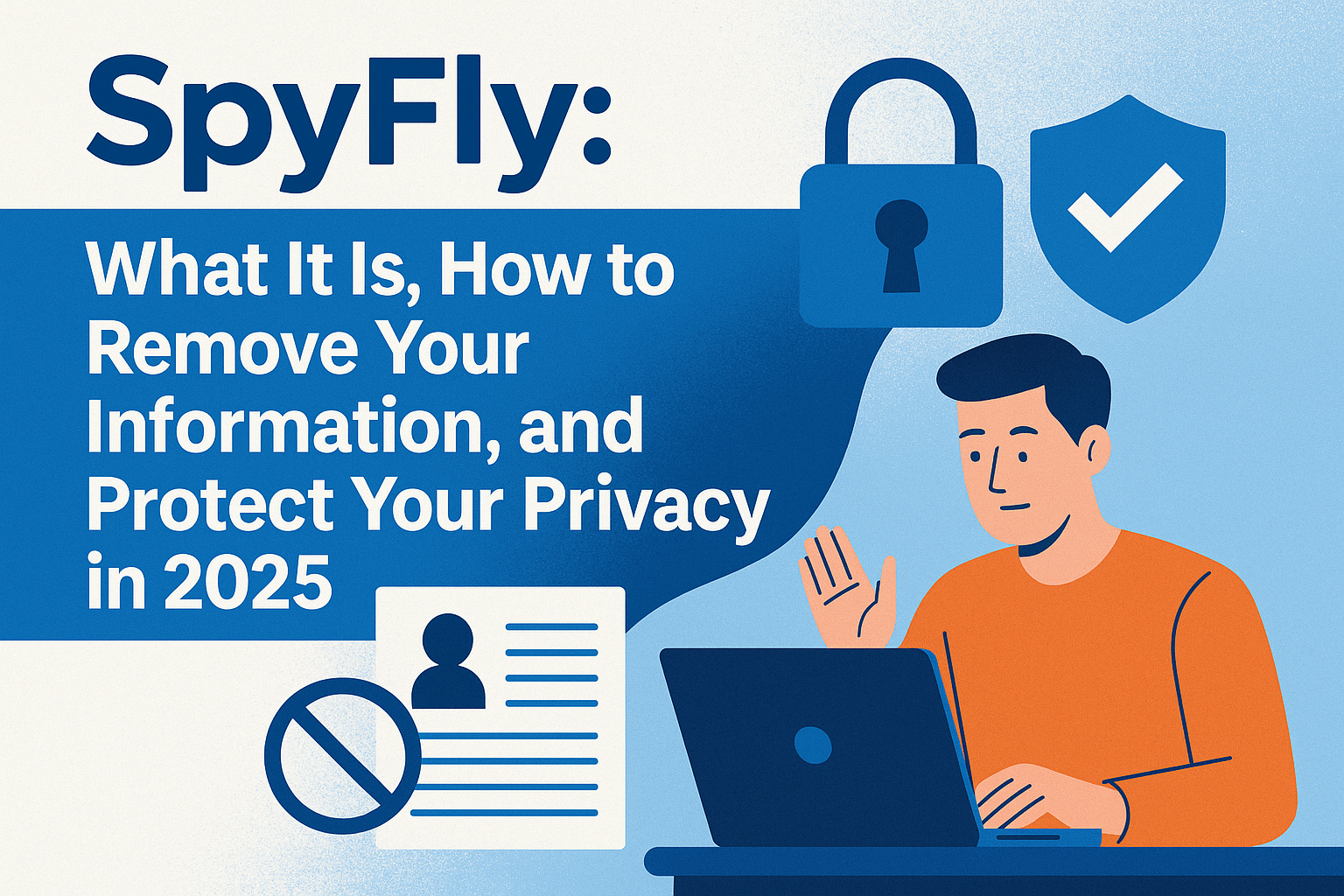Estimated reading time: 5 minutes
What is SpyFly?
SpyFly is a subscription-based background check service. It aggregates public records, offering users instant access to:
- Criminal records
- Arrest and court filings
- Marriage and divorce records
- Contact details such as phone numbers and addresses
- Social media profiles
- Employment and education history
While marketed as a tool for employers, landlords, and individuals conducting background checks, it also creates privacy risks by exposing sensitive details.
SpyFly pulls data from multiple sources:
- Government databases (court filings, arrest logs, inmate records)
- Public records (property deeds, voter registration)
- Social media platforms (linked profiles and usernames)
- Third-party data brokers that resell consumer information
Once collected, your details are displayed on SpyFly’s platform and may appear in search engine results, exposing personal information to strangers.
Why SpyFly is Controversial
SpyFly is part of a growing industry of people-search and background check websites. Critics highlight concerns such as:
- Invasion of privacy – sensitive data made publicly accessible.
- Risk of identity theft – exposure of addresses and phone numbers.
- Employment discrimination – employers may misuse outdated records.
- Reputational damage – even dismissed cases can tarnish someone’s name.
“Having your personal records on SpyFly can make you more vulnerable to fraud, scams, and unwanted scrutiny.”
The Risks of Leaving Your Data on SpyFly
Leaving your information exposed on SpyFly can lead to:
- Harassment or stalking from bad actors
- Spam calls, phishing, or unsolicited contact
- Reputational harm from outdated or inaccurate records
- Potential misuse of data in financial scams or identity theft
How to Remove Your Information from SpyFly
SpyFly, unlike many free people-search platforms, is subscription-based and doesn’t provide an easy public opt-out form. However, you can take the following steps:
Step 1: Contact SpyFly Customer Support
- Visit the SpyFly contact page.
- Submit a removal request via their support system.
- Provide the URL of the listing you want removed.
Step 2: Revoke Authorization
If you’ve signed up for SpyFly:
- Log in to your account.
- Access account settings.
- Cancel the subscription and request full deletion of stored personal data.
Step 3: Suppress Your Data in Search Engines
Even if SpyFly removes your information, cached pages may remain on Google. To fix this:
Go to Google’s Remove Outdated Content Tool
Submit the URL of the SpyFly page
Request removal from Google’s index
Step 4: Opt Out of Data Brokers
Because SpyFly sources information from data brokers, removing your data at the source reduces reappearance. Focus on:
- LexisNexis
- Acxiom
- CoreLogic
- Whitepages
Each offers an opt-out process through their privacy or consumer request pages.
Why Removal is Challenging
Even after a successful request, your information may resurface because:
- SpyFly updates data feeds from public records.
- Data brokers repopulate removed records.
- New filings (property, court, voter registration) refresh information automatically.
This is why ongoing monitoring and suppression strategies are crucial.
Advanced Strategies to Protect Your Privacy
1. Freeze Your Credit Reports
Prevent fraud by freezing credit at:
2. Use Privacy-Focused Tools
- VPNs to mask IP addresses
- Secure browsers (Brave, Firefox with extensions)
- Encrypted communication apps (Signal, ProtonMail)
3. Create Positive Online Content
Publishing professional profiles and websites pushes SpyFly results lower in Google rankings.
4. Automate Monitoring
Set Google Alerts for your name, phone number, and address to track reappearances.
How Remove Online Information Can Help
DIY removals are time-consuming and often temporary. Remove Online Information provides comprehensive solutions:
- Direct removal requests from SpyFly and similar sites
- Bulk opt outs from dozens of data brokers
- Suppression of harmful listings in Google search results
- Continuous monitoring for reappearing data
📌 Start protecting your privacy today: Visit Remove Online Information.
Case Study
“Jessica,” a teacher, discovered her home address and arrest record (later dismissed) on SpyFly. Despite repeated requests, the data resurfaced. With Remove Online Information, her details were removed across multiple databases, restoring peace of mind and safeguarding her professional reputation.
FAQ Section
Yes. SpyFly is a paid background check service, but its practices raise privacy concerns.
Yes. Anyone with a subscription can access your records.
You must contact SpyFly support directly, as no public opt-out form exists.
SpyFly aggregates data from brokers and may share information as part of its services.
Criminal history, marriage records, addresses, and contact details.
No. Information may still exist on public records and data broker sites.
Responses vary; some requests take weeks, and reappearances are common.
Yes, but they must comply with the Fair Credit Reporting Act (FCRA).
File a complaint with the FTC or seek professional removal services.
They handle bulk removals across multiple platforms, track reappearances, and ensure stronger long-term suppression.
Quick Checklist
- ✅ Search for your data on SpyFly
- ✅ Submit a removal request via customer support
- ✅ Cancel any account and request deletion
- ✅ Opt out from data brokers
- ✅ Request Google to remove cached pages
- ✅ Monitor regularly with Google Alerts
- ✅ Partner with Remove Online Information for long-term protection
Protecting Your Privacy in 2025
SpyFly highlights the broader issue of how easily personal records are exposed online. Removing your information is possible, but requires persistence and ongoing defense against data reappearance.
With Remove Online Information, you gain a partner in privacy—handling removals, suppression, and monitoring so you can safeguard your identity and reputation.
👉 Take control today: Visit Remove Online Information and remove your information from SpyFly and beyond.
Works Cited (MLA Format)
Federal Trade Commission. Consumer Privacy and Identity Protection. FTC, 2025, https://www.ftc.gov/.
Google. Remove Outdated Content. Google Support, 2025, https://support.google.com/websearch/troubleshooter/3111061.
Electronic Frontier Foundation. Surveillance Self-Defense. EFF, 2025, https://ssd.eff.org/.
Missouri Courts. Expungement Information. Missouri Courts, 2025, https://www.courts.mo.gov/.

